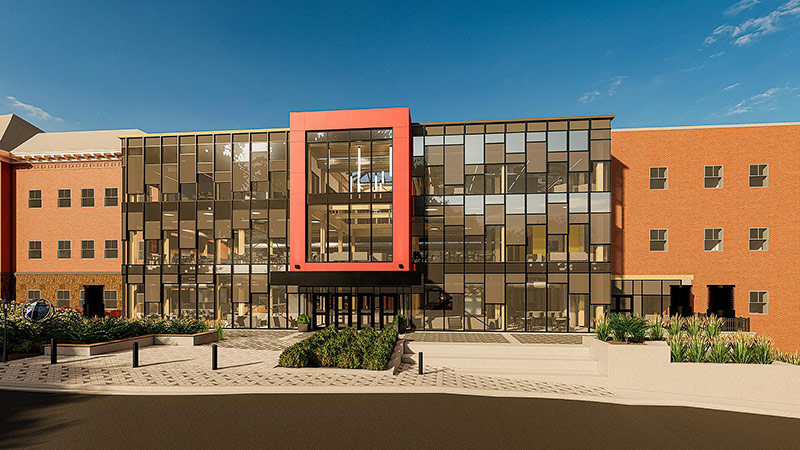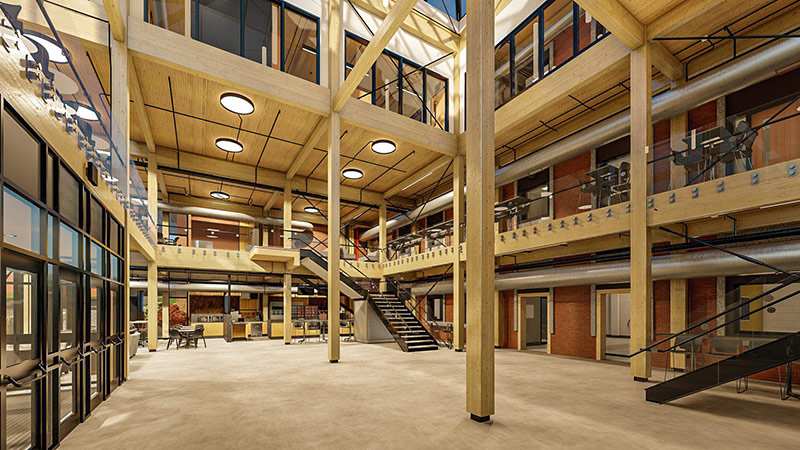Engineering commons will be a 'living laboratory' for innovative students
Author: Angie Deveau
Posted on Nov 22, 2023
Category: UNB Fredericton

The University of New Brunswick (UNB) engineering faculty, the longest-standing in Canada, is revolutionizing its legacy with a sustainable twist as it constructs the new engineering commons, an open-concept learning space supported by mass timber wood columns with a glass façade, blending innovation with a deep appreciation for its historical significance and the province's forestry heritage.
“A big feature of the building is the mass timber,” said Greg Murdock, president of Murdock & Boyd Architects. “People will gravitate to wood because it's warm, it feels good. It's part of our culture. All the engineering disciplines that provide services to the building, such as mechanical ventilation, plumbing and electrical, would be exposed. It would be almost like a live laboratory for all students studying in the building.”
Murdock, the lead architect on the project, said when UNB first approached them about building the commons, the university wanted to create more space for undergraduate and graduate students to collaborate and exhibit their work in a public area.
The renovation and expansion of Head Hall is a $22.9 million project that will create a cutting-edge, sustainable space for learning, collaboration and innovation. The use of the mass timber is one of the signature features. Construction began the week of April 10 and is expected to be completed by June 2024.
The project was made possible by a cornerstone gift of $1.1 million from UNB engineering alumnus Bill Cooper (BScCE'62), who has been a generous donor to the university for more than 40 years. Alumni and friends have contributed over $5 million to the project.
The university is working with construction manager EllisDon and Murdock & Boyd Architects to complete the commons. They will provide necessary upgrades to the existing space and construct the three-story atrium as an addition to Head Hall. Nearly 20,000 sq feet of new space will support the growing undergraduate, graduate and research needs of the faculty of engineering.
Jason Allain (B.Eng ‘99), the construction manager for the EllisDon New Brunswick Operations, said the commons will be constructed with several innovative energy-efficient features, including LED lighting control systems, sensors for sinks and low-volume fixtures like toilets.
With mass timber construction, they also consider safety.
“Something unique about this project is the updated sprinkler system,” said Allain. “Since mass timber is new to the industry, especially in Atlantic Canada, we have found a better way to do it. The system will be much more sensitive to smoke and provide an extra layer of safety.”
Craig Hickey, director of projects with capital planning and operations at UNB, said this project aligns with UNB’s sustainability goals while keeping operational and maintenance costs low.
“We will install new heating and electrical systems which will allow us to get rid of a lot of deferred maintenance of our existing systems,” said Hickey.

“With earth tube technology, the space will pre-heat or pre-cool fresh air used in the ventilation system by moving it through underground pipes to take advantage of the surrounding soil's temperature,” he said. “We will also install a heat recovery chiller/heat pump to heat and cool the renovated spaces by taking advantage of heat recovery and energy exchange from other parts of the building.”
At the heart of the commons will be the Student Success Centre. This 1,500-square-foot room will enhance the student experience.
Dr. Josh Leon, dean of UNB’s faculty of engineering, said the new space will allow for the expansion of services, including tutoring for core courses, peer mentoring, an early intervention program, counselling services, study skills courses, academic and career advising, as well as laptop and technology loan programs.
He said the new commons will encourage collaboration among students.
“Engineering has changed a lot over the years,” said Leon. “We need spaces for students to meet and get together to talk about problems.”
Leon said engineering is much more multi-disciplinary than it used to back in 1960, you hired an engineer, and he did the drawings in an office by himself,” he said.
He said this is no longer the case.
Leon said the faculty prioritizes teaching group dynamics to respond to the needs of the workplace. He also said the additional space will allow them to meet their short-term goals for growth. This means increasing student numbers.
“There is a huge demand for engineers in Atlantic Canada and across the country, so we are responding to that need,” he said. “This new space will not only speak to our history, but it also speaks to our future.”
To support the Engineering Commons or to learn more, contact Craig Poole.
